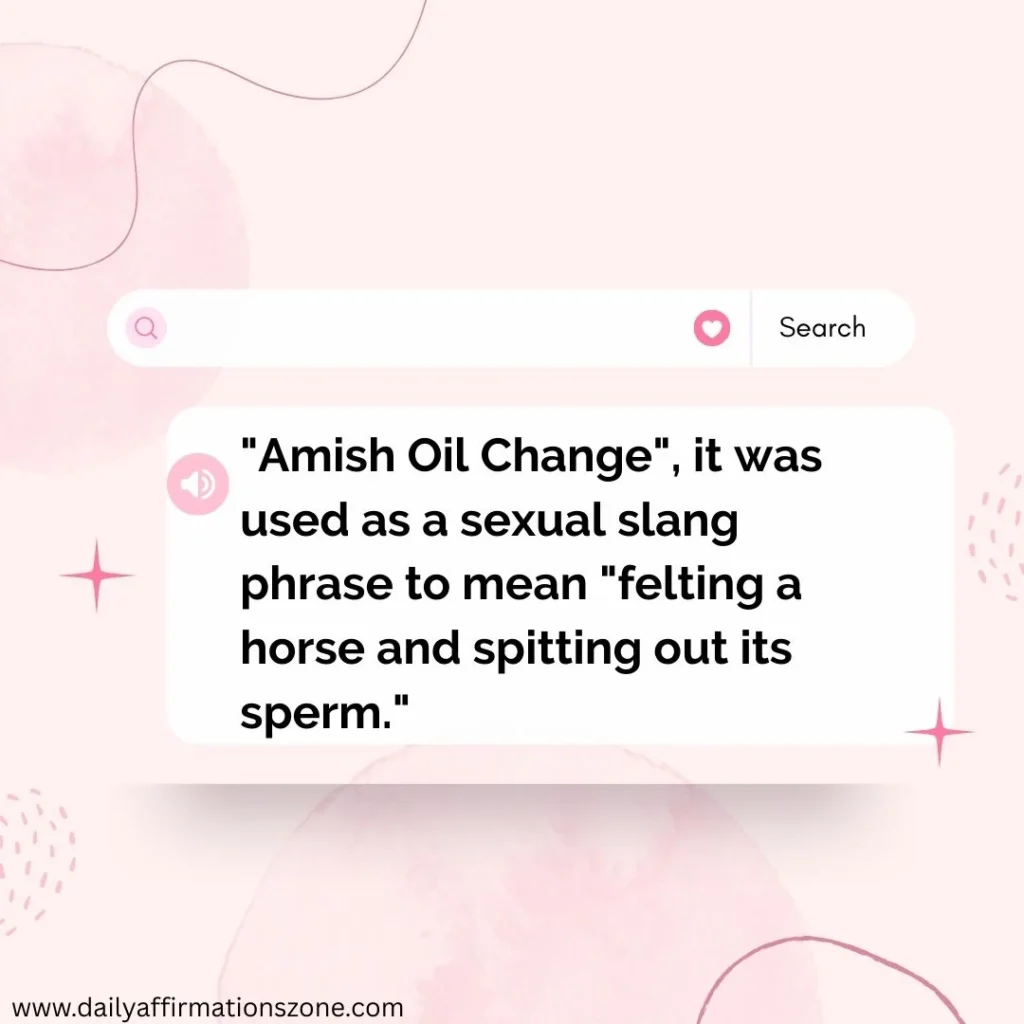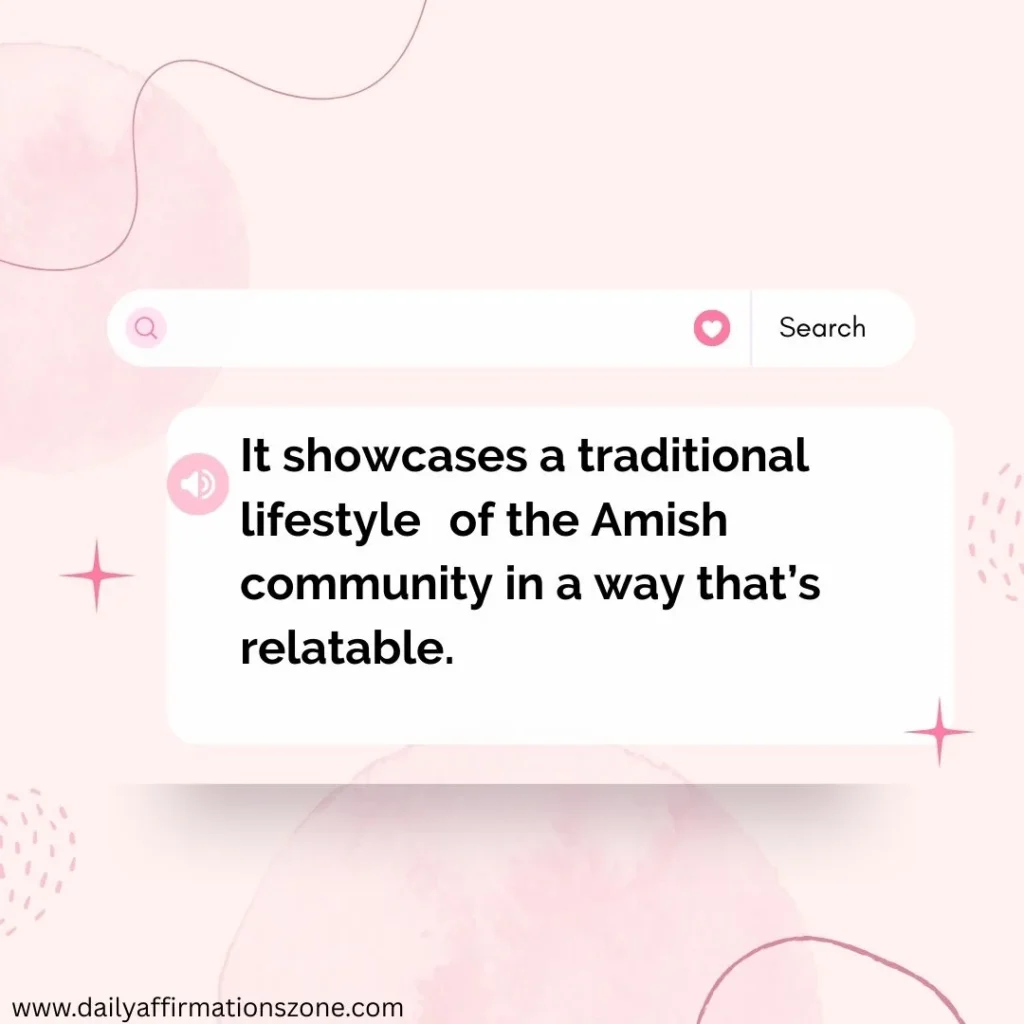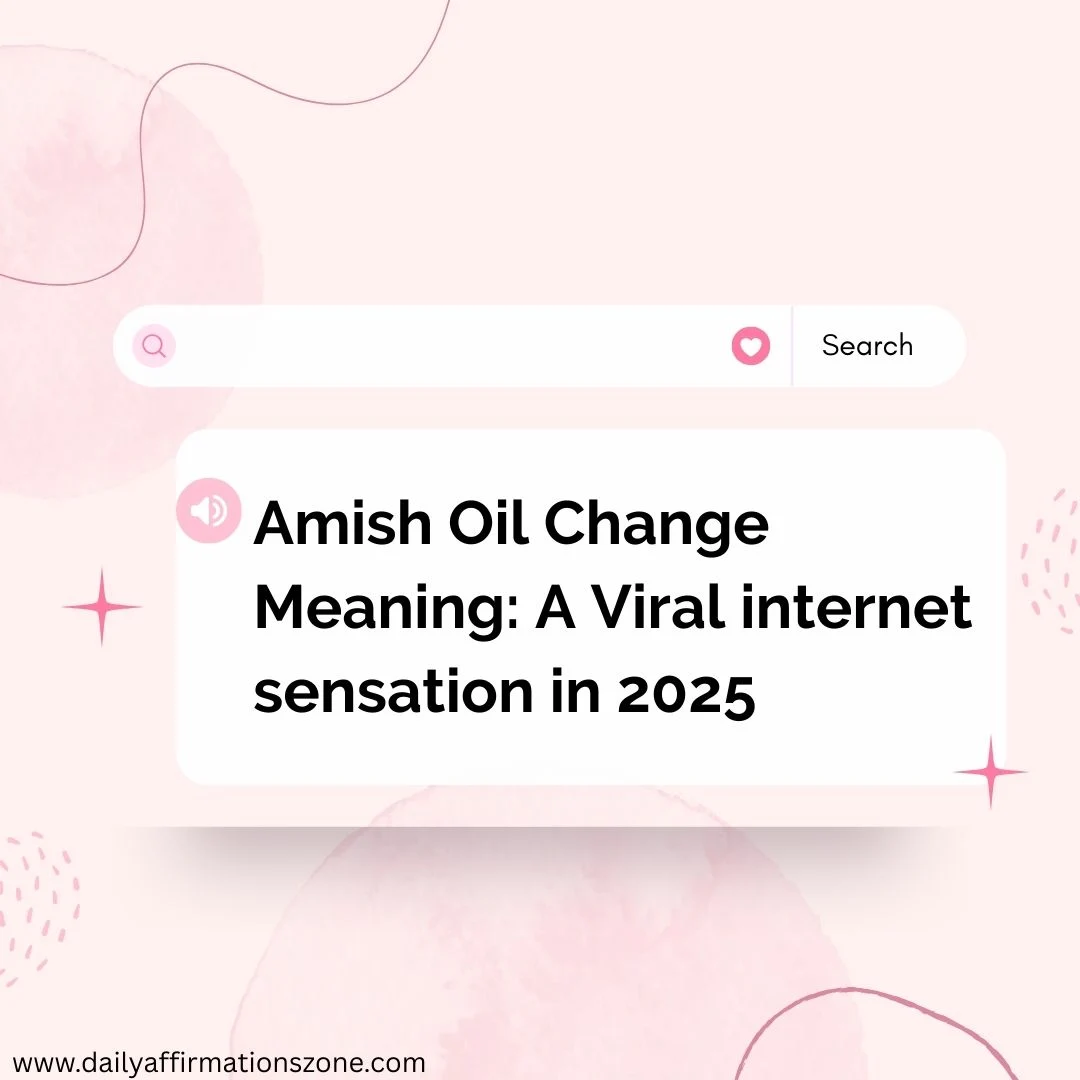The “Amish Oil Change” is a viral internet sensation in 2025, though certainly not as the name suggests. This line is a perfect example of how internet culture comes up with coded language that might appear harmless on its face but means something else entirely.
This has led to many questions and the internet is inevitably filled with interesting – or simply strange and funny – interpretations of this phrase.
In this article, we’ll unpack the real history of the so-called Amish Oil Change meaning, go back to where it all began, and explain why we’re still talking about it today.
Whether you’re a car aficionado, an Internet lingo lover or simply only just now hearing the term, we’ll catch you up.
Read on to find out what this interesting term is all about!
What the Heck Is an Amish Oil Change?
The first time I saw the word “Amish Oil Change” online, it was used as a sexual slang phrase to mean “felting a horse and spitting out its sperm.” The word linked to intimacy showed up on TikTok in 2022 and 2023. In late 2023, people posted memes and their reactions to learning about it, which caused a big rise in search interest. The meaning of this phrase comes from the fact that most Amish people get around in horse-drawn buggies instead of cars. This means that the horse is basically the engine.

The saying circulated on some social media platforms, especially among young internet users who like to create coded languages and secret jokes. It’s part of a larger trend where seemingly innocent words have been co-opted to talk about adult things while skirting content filters or with plausible deniability in conversation.
And no, the term has nothing to do with the Amish people, their lifestyle or the automotive methods they prefer to employ. In respectful Amish terms, who are the poster child for simple living and going back to good ol’ traditional values, this controlling character as the poster child for the modern tiny home movement is this generation’s ideal Thoreau fanboy fantasy.
Knowing terms like this can make it easier to navigate the world of modern digital communication, but try not to lose sight of audience and context when you encounter it.
Definition of Amish Oil Change?
The term Amish oil change can mean a couple of different things, some more literal, and some funnier:
Literal Meaning
The Amish don’t drive, they don’t do what you would think of as an oil change.” Instead, they maintain:
- Horse-drawn buggies lubricated by axle grease and wheel melt.
- Farm tools and equipment such as plows but excluding non-motorized implements.
- Some Amish communities use diesel-powered generators.
Humorous & Slang Meaning
Among non-Amish people, the “Amish oil change” can also be a joke or slang for:
A number of you have told him that this pandemic is like greasing the wheels on a buggy when its wooden wheels are no longer smooth, and you wonder why you are not doing something more productive, such as changing the motor oil in a car.
Doing something in a humdrum, old-fashioned or too-simple manner.
A snarky name for not even bothering with an oil change.
The combination of literal seriousness and humorous ambiguity has caused the phrase to gain popularity online.
Understanding the Real Amish Oil Change Meaning
When people first hear the term “Amish oil change,” typically, they assume that the phrase is synonymous with something else -like a change of your car’s oil or a classic Amish way of tending crops or animals – not the world’s oldest profession. But the real meaning of the Amish oil change has absolutely nothing to do with these innocent interpretations. This phrase is a perfect reminder of the internet’s magical quality of twisting normal words into a code with a demented subtext.

The slang acts as a euphemism in text messages, online discussions, and everyday speech especially for younger users who cultivate increasingly complex systems of coded communication for discussing grown-up topics under the veil of plausible deniability. The Amish oil change definition has no relation to the Amish people, their way of life or the truth about car care itself. In fact, it operates as computer jargon that permits people to allude to sexually reserved activities with another person without being explicit.
This linguistic process is an example of how digital subcultures subvert content regulation and social norms. The juxtaposition of the sweetness evoked by that Amish imagery versus the true connotation is ironic, and appeals to the internet’s appreciation for a joke and secret knowledge.
How the Amish Work on Their Equipment Without Oil Changes
Buggy Care & Lubrication
Unlike cars, Amish buggies have wooden wheels with metal axles, and so they require different maintenance:
- Axle Grease: Polished on to high and wear.
- Wood Maintenance: Wheels won’t split using oils.
- Leather Harness Lubricant: Preserves condition of horse equipment Oil.
These age-old techniques eliminate the need for current oil changes.
Lubes for Farm Tool and Equipment
Even though they eschew the car, the Amish don’t exclude other farm tools that need repairing:
Equipment Lubrication Method
Ploughs drawn by horses oiled Joints and axles.
Hand tools (saws, drills) Oiled to prevent rusting of metal parts
islamicqpons Water pumps Hand operated lubricant systems
They don’t go to the place that changes the oil, but they do keep up with some mechanical maintenance.
Potential Etymology for the Phrase “Amish Oil Change”
How Did This Phrase Originate?
No one has officially documented the origins of “Amish oil change,” but some theories include:
- Online humor & memes: The phrase went viral in jokes about a simple life.
- Rural mechanic slang: Sarcastic term for procrastinating an oil change.
- Workshops & farming communities NEVER replace a motor oil when you can just grease something.
Modern Usage & Popularity
Today, “Amish oil change” comes in:
- Online Message Boards & Communities.
- Comedy skits & satire videos.
- Talk in country mechanic shops.
While it originated as a jargon term, it has entered popular use.
Origins and Evolution
The term spawned from the internet world, where the meme community and social networks often come up with relatively innocuous-seeming names for things to do with grown-up things. This linguistic creativity serves as a multi-purpose tool for avoiding content filters, nudging naysayers to look the other way and creating a kind of in-group knowledge that distinguishes those ‘in the know’ from indifferent onlookers.
It picked up a lot of steam in 2024, quickly blowing up in 2025 when it spread over social media including TikTok, Twitter, Reddit, and forums. Its ascent is proof of the larger phenomenon of online users using creative hacks to get around platform bans and social stigmas.
Read Mamushi Meaning In Japanese: How It’s Used Today In 2025
Common Misconceptions About Amish Oil Changes
1.Do the Amish Ever Use Oil?
Yes! Though not for that:
- Buggy wheels & axles
- Farm tools & machinery
- Diesel Engines (in some communities, allowed)
Are The Amish Fixing Modern Cars?
(There are a few Amish and Mennonite mechanics who operate shops, fixing non-Amish vehicles, but they do not own them or drive them.)
- Do Amish Use Any Modern Machines?
- Though they do keep clear of cars, they do:
- Diesels for the farm.
Solar panels & battery powered devices in some places.
Equipment without electronic parts.
The Amish practice selective use of technology, only opting for what fits into their lifestyle.
Why “Amish Oil Change” Was Stuck on the Phrase

It’s popular phrase still due to:
What a funny way to say you ignored the date of your oil change.
- It showcases a traditional lifestyle of the Amish community in a way that’s relatable.
- It’s employed in mechanic shops, rural climes and online culture as well.
Though they don’t change motor oil, the Amish have their own ways of maintaining automobiles, making the phrase relevant.
Social Media and the Amish Image
The physical exercise ingrained in the Amish way of life including the manual maintenance tasks embodied by the Amish oil change helps much with the health and well-being of the community. Often absent in more sedentary, technologically oriented society, direct engagement with their surroundings and the physical effort needed for daily duties encourage physical fitness and well-being. This aspect of Amish living highlights the probable health benefits of a lifestyle that gives physical work and outdoor recreation top importance.
Examining the nuances of Amish society, their wise use of technology, and the greater cultural insights it generates calls for a varied metaphor: the “Amish oil change.” From this vantage point, we discover a community honoring simplicity, sustainability, and a strong sense of belonging values that appeal to many in a society going faster and more disconnectedly.
Read Hoda Meaning : Origins, Symbolism, and Cultural Significance 2025
As social media keeps magnifying these dialogues, the Amish oil change stays a stirring reminder of how civilizations negotiate the complexity of modernity, technology, and traditional preservation. Seen via the prism of custom, lifestyle, or artistic expression, it encourages us to rethink what we value in our interactions with technology and one another and catches a dynamic conversation between the past and present.
The Broader Phenomenon
“Amish Oil Change” is just the latest example of a trend in internet culture where new euphemisms and coded language are constantly being developed by users. Other such examples include an array of innocuous-sounding terms that developed new meanings when transported to the Web.
This is representative of the fast-paced nature of digital communication, in which the evolution of language happens at a rapid pace, and communities create their own linguistic shortcuts and allusions. It also shows how internet culture frequently functions on multiple levels of meaning, where seeming innocence on the surface hides ever deeper and more complex forms of communication.
Why People Use This Term
Outsmarting Filters: A number of social media sites use bots to identify nsfw content. Employing a coded language allows users to talk about adult content while bypassing the algorithms used for such filtering.
Cohesion within the In-Group: Knowledge of slang contributes to a feeling of camaraderie between members who understand the references but not between members and outsiders Intelligencers In-group identity).
Humour and irony: The humorous irony of juxtaposing idyllic scenes of Amish culture with their alternate meaning provides a suitable style of irony for the patrons of the Internet.
Plausible Deniability: Pe1ople can sort of use it in mixed company or unsure company without actual offense.
The Evolution of Internet Slang in 2025
The year 2025 has seen an extraordinary explosion in the development and dissemination of internet jargon. The Amish honey meaning is a prime example of how fast coded language can emerge and penetrate the It lacks phonemic vowel length. (){ } forked tongue snake meaning and be embraced in the mainstream on our hyper-connected digital world. It’s a linguistic creep that has been driven by factors like social media algorithms, content moderation systems and our never-ending thirst for creative expression.
Unlike vernacular slang, which can take years or even decades to travel geographically, internet lingo can go mainstream worldwide in days or weeks. You can even see the amish oil change meaning as an example of audiences reassigning the meaning of an existing phrase in a shared, purely digital culture, no allusion to any real-world context or culture intended.
This fustily evolving language has several uses online. It also is a method of separating generations of people, creates a notion of inside versus outside between users who get the references and users who don’t, and a work-around for restrictions that would impair best-of-class types of discussions.
The Future of the Evolution of Internet Language
With 2025 around the corner, the Amish oil change sense is just another instance of how internet linguistics can change at a breakneck pace. The bubble that created such an outstanding catch phrase in the first place is sure to spawn a million others and turn our understanding of communication on its head.
How quickly such names can be widely recognized says something about what internet language may look like in the future: It will only get more dynamic and contextual. Understanding these trends will enable us to anticipate further linguistic evolution and the future of digital communication.
The Amish oil change meaning is an interesting exemplar that demonstrates the way internet culture can change language, create community, and disrupt the traditional distinctions between coded and non-coded language. While online discourse becomes increasingly influenced by digital natives, further creative and unexpected linguistic developments will continue to emerge over the following months and years.
Read Psycho Meaning Explained: Origins, Best Usage, and Modern Context 2025
How People Take Up Coded Language Like This
Such words with secret meanings are an expression of a variety of psychological and sociological elements that shapes our online experience in 2025. But peeling back why people are so drawn to expressions like this offers a fuller look at digital language and social behavior.
Content Filter Evading: Newer social media platforms are now using advance algorithms to scan and filter our adult content. The Amish oil change definition allows users to engage with topics that, in more direct dialogue, would trigger these automated systems and have a conversation flagged or erased.
Societal Cognitivity: When we know what the coded references mean, we feel a sense of camaraderie with those in the know. The Amish oil change definition is something that gains you social capital with the people who understand it and leaves everyone else out in the cold because they don’t understand that it points to a specific set of approaches and values in a way of doing things.
Irony and Humor: The ironic humor inherent in the stark dichotomy of innocent-sounding phrases and their mean spirited definitions is what your average internet comic lives off. The Amish oil change slanguage meaning is of a pattern, the relative contrast between what we expect and the the actual, which leads to humor.
Deniability: With coded language, Patrons can point to the fact that they did not say anything lewd and be like “what can you do”. The person using that term COULD potentially argue that they were discussing real car maintenance, all to the previously-presented context aside.
The Sociocultural Influence of the Invented Language
The mainstreaming of words like these speaks to wider shifts in the ways that people communicate and connect in the digital age. The Amish oil change definition: Well, that’s as good as a case study in how fast slang can be born in the age of social media platforms and networks.
This has significance beyond just communication. It shapes generational relationships, corporate playbooks around social media ads, how content moderation systems are built and will continue to be built to canonicalize new patterns of speech. And the Amish oil change definition is just one instance of how internet culture is constantly eroding traditional demarcations between public and private language.
Schools and academics have also started looking into these language changes in an effort to understand how the way we communicate online is changing the way we use language. The fact that such terms can be rapidly taken up and propagated is a useful window into how groups and communities work, into some of the mechanisms of social psychology and how cultural meanings are made and spread.
Read Anjin Meaning in Japanese: Origin, History, and Modern Use
Getting by in the Digital Age
These are expressions to learn in the age, for anyone, who wants to find their way effectively through today’s virtual territory. The Amish oil change definition points to the need for digital literacy: to identify coded language, grasp context clues and negotiate communications that work on both levels (what the words say and what the words suggest).
For parents, teachers and anyone engaging with online communities, being in the know about these linguistic shifts helps cross the generational divide and may lead to better communication. Not everyone has to take up such words, but acknowledging them and understanding their use can avoid confusion and improve relationships online.
The episode raises larger issues about the challenges of making cultural references across the digital divide. This is because the same term could have completely different implications based on the medium, audience, and context (discussion thread) in which it appears.
Conclusion
The phrase “Amish oil change” may have begun as a joke, but it represents real elements of Amish transportation and mechanical upkeep, experts said. They might not change the oil like car owners, but they tend to their buggies, their tools and their farm equipment in the same way and that means you’ll see plenty of them pulling a squirt or two from a traditional squeeze container.
Literal or spiteful, it continues to be an interesting peek at a bit of the Amish world and how primitive things do quite well in place of the modern.
Do you think you would take an “Amish oil change”—or a more minimalist approach to vehicle maintenance? Let us know in the comments!








